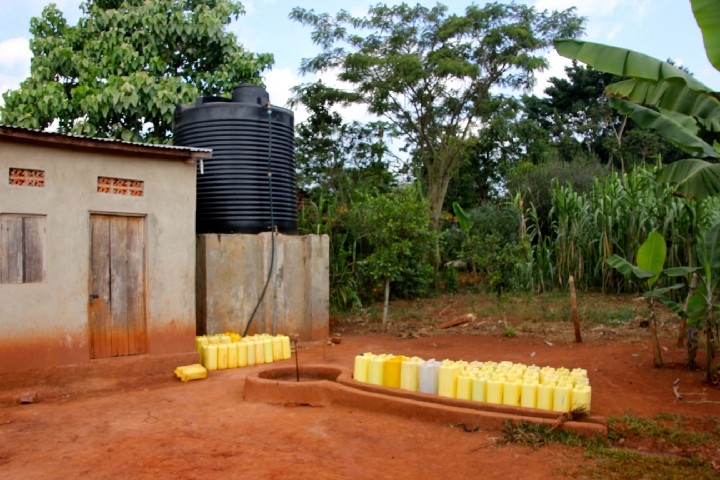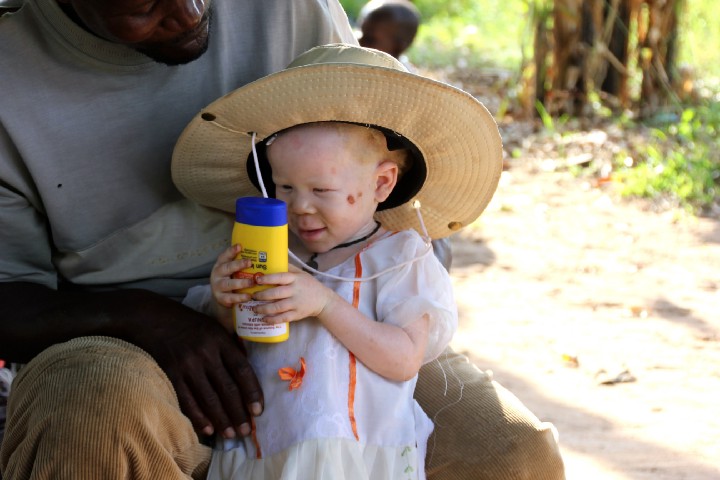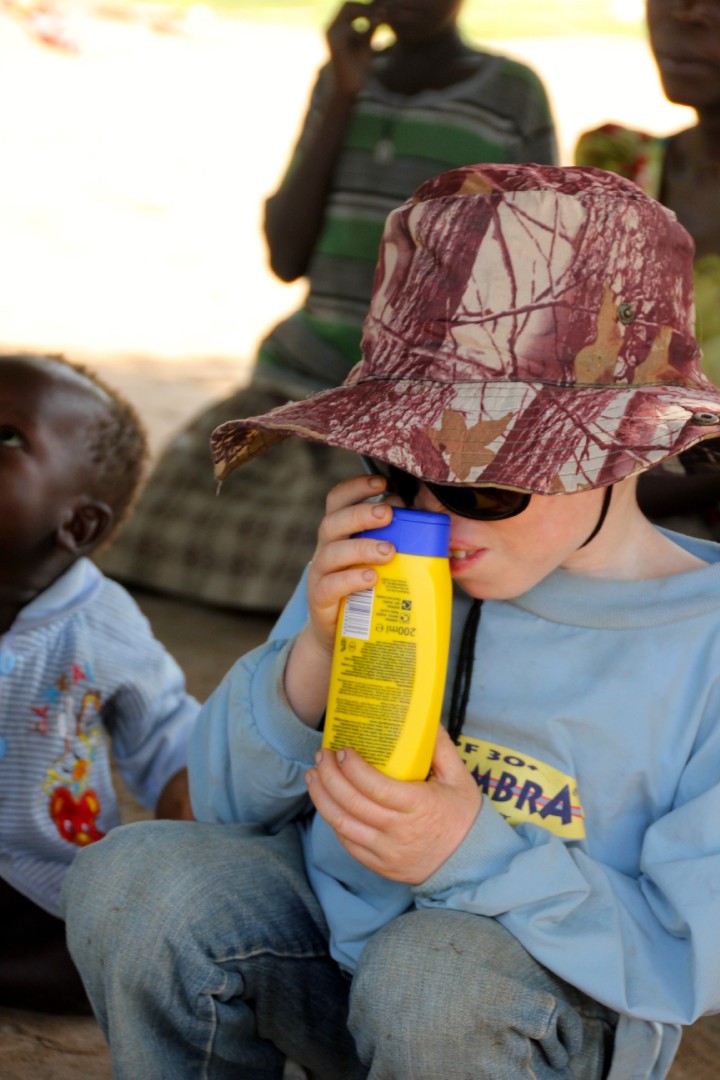A Suitcase Full of Sunscreen
Four months ago I packed two suitcases. One with the necessities. One with 50 bottles of sunscreen. (Which, one could easily argue, were the larger necessity on this particular trip.) I stepped on a plane at Heathrow, and I stepped off into Africa.. the land where Man began, and where the oldest roads are elephant paths.
Specifically, I met the land and people of Uganda.
I was in Uganda to meet up with Andrew Betts of Advantage Africa, as he was taking me to visit with the albinism community Let Yourself Trust had partnered with at the end of 2015.
As you read this, your next thought might (rightly) be — why in the world has it taken me four months to share my experience?? Have I broken both wrists? Am I incapable of typing a word? Have I been staring at my powerless computer after having lost all of my chargers and most of my sanity?
The simple answer is.. this trip was so very powerful it demanded time to sink into. It asked for silence and reflection and space. Four months later I am still processing all the fragility, all the colour, all the vibrancy. It moved me in ways I am still grappling with, but I thought it time to put words on paper, to try to fit some of it into a sharable experience.
A landlocked country in East Africa, Uganda is bordered by Kenya, the South Sudan, the Congo, Rwanda and Tanzania, and is nestled within the Nile River basin. It is Africa — primal, sweltering, and even within the cities the horizon is absolutely brimming with landscape. You land in Entebbe Airport, a tiny metropolis of activity just outside of Kampala, the largest city and capital of Uganda. Waiting to greet you is Andrew, and he immediately introduces you to new friends. You are whisked away to a truck, luggage strapped down in the back, and your adventure begins.
Before going on to Jinja, the base camp of activities with the albinism community, Andrew shows myself and my traveling co-pilot Lindy a few of the other projects Advantage Africa are involved in. In the neighbourhood of Kampala we travel to the tiny village of Ggaba. There is standing water everywhere you look — still drying walls show us the water level has been even higher very recently. The water lays still, a filmy, dull green filled with mildewed wrappers and decomposing trash — a mosquito breeding ground, and a cesspool for malaria. It is appalling that human beings must live like this.
We are greeted by the community there, a dozen adults sitting in a line on handwoven mats on the ground, barefoot children playing quietly or sitting beside them.
A woman beckons us with wild arm gestures and a wider smile — please, come and sit with her in her home, she asks. There is no refusing such an offer, and we gingerly walk down a wooden gangplank bridging the cesspool between the community and her doorway. We duck inside her hut, blinking the sunshine away as we step into a dank darkness that physically assaults the senses with its rank, rotting odour. A roughly 5x5 foot space in total, there are two bench-like couches facing each other that we squeeze onto. A torn mosquito net with fist-sized holes hangs behind one couch and first one, then two little faces peek out.
The other corner of the hut is the ‘kitchen’, a small stove on an ash filled floor. She tells us she has 5 children that live here — the sheer logistics of it boggles the mind. She points to the couches, a small chair shoved in behind, and explains that last week the water was at knee height and the children stood on chairs to move about the room. We gently thank her for inviting us into her home and return outside to greet the rest of the community.
Andrew introduces us to Maria, a joyous spark of a woman in a billowy yellow dress, and she proudly opens the door to their ‘shop’. A concrete bunker the size of a garden shed, it’s filled with an abundance of colour — hand made crafts crammed into every spare inch of real estate. Rainbow coloured bead necklaces lay in piles, and Andrew explains that each bead is handmade by carefully rolling small bits of paper into a perfect ball, then shellacking and painting them once dry.. Each bead takes an entire day to make.
We are overwhelmed by the choices of banana leaf woven bags, recycled leather stitched sandals made from old tires, beautiful aprons, skirts and more. We learn that along with living in abject poverty, this community is part of SPAU — Single Parents Association of Uganda — and that each of these adults is a single parent, most of them HIV positive. We meet one young woman who is dealing with both HIV and cancer. These crafts are their means of income, their sole support for their family. Lindy and I purchase as much as we can, even emptying Andrew’s pockets with promises of IOU’s to repay him.
Our journey has just begun, and already our emotional bearings have been loosened by the stories we’ve heard, the people we’ve met. We move on to the village of Katente, and to other SPAU sponsored projects.
Chickens. Pigs. An electrical pump. To us they are cute animal noises we teach our toddling children to make them giggle, basic household devices in case of too much rain. In Uganda Andrew shows us how they are life changing, family supporting, community saving. To a woman in Uganda, one pig became 6 piglets became the ability to put her four children through school.
She uses the pig manure to fertilise her land and grows coffee, cassava, peanuts and bananas. The bananas are boastfully yellow, matching the pride in her face as she gives us the tour of her lush land, her gorgeous young daughter leading Lindy by the hand.
Later, we visit a small plot of land hosting a barrage of plastic yellow containers lined up in neat rows — jerry cans waiting to be filled with 5 gallons of clean water.
Andrew shows us the electrical pump that’s been provided, and how it leads to a tap that can be turned on by hand. As we’re chatting, several young boys come and go, each 6 or 7 years old, covered top to bottom in dirt, barefoot and dressed in rags. They pay 200 shillings (approx 5p/less than 10 cents) for 1 can of water, and Andrew explains that this simple pump saves people half a day of sourcing water, time now spent working and earning an income they can bring home. Before we leave I lift up a pre-filled can — it weighs over 40 pounds! When you’re forced to carry it, the weight of water teaches you its value, and I leave with a new respect for the young boys that have come and gone.
This is not my first visit to a third world country, but merely into my second day in Uganda, already I have come across more poverty than I have ever experienced. I’ve since learned that Uganda hosts a population of 37.5 million people, and as of 2012, 37.8% of the population lives on less than £1 ($1.25) a day — that’s over 14 million people!
We moved on to Jinja next, to focus on our friends within the albinism community. Jinja has the second largest economy in Uganda, with the average annual household income estimated at $100 US (£70–75). That such poverty is so widespread is so difficult to comprehend, and this is before we understand what it means to have the additional complexities of being a person born with albinism.
Peter, Head of SNUPA, in one of his representative’s local villages
Jinja brings us to Peter, who is in charge of SNUPA — Source of the Nile Union of Persons with Albinism. Peter is one of the hardest working people I have ever met, and the central connecting hub for all things within the albinism community. Among other duties, he is Andrew’s main contact in Jinja, and he leads a group of 10 volunteers who are the representatives for the districts within Uganda. Each is tasked to seek out and support any person or persons dealing with albinism within their region (and they are vast regions), and Peter educates, supports and leads them in their task.
What does this mean, exactly?
It means providing people with albinism — who have a 98% chance of dying of skin cancer before the age of 40 — with bottles of sunscreen.
For some, it’s the very first bottle of sunscreen they’ve ever seen and Peter demonstrates to the reps how to show them to spread the lotion on their arms, their necks, their ears, their faces, and those same parts of their children.
It means providing long sleeved clothing, hats, lip salve for cracked, bleeding lips.
It means educating families on when to keep their children out of the sun, at the height of the afternoon and when it’s strongest.
It means providing skin checks — bringing Dr. Ngobi, SNUPA’s dermatologist, to their villages to search their bodies for lesions and signs of impending cancer or other serious skin conditions. Thanks to Advantage Africa (and Let Yourself Trust’s) efforts, Dr. Ngobi has also recently been provided with a portable cryogenic machine that he can use to freeze troubling skin lesions — literally a life saving device in many cases, and one of the only such devices in Uganda.
It means educating the representatives and villages where people with albinism reside on what causes albinism — the lack of melanin, the root genetic cause between parents — and to gently correct severely erroneous and potentially challenging thinking. I learn that it’s often believed that people with albinism are ghosts, or their families are cursed, or even more horrifying, that sleeping with a woman with albinism (voluntarily or not) will cure HIV.
Andrew explaining how genes work and the percentages of two parents having a child with albinism
While in Jinja, Peter holds what is a quarterly meeting of the district representatives — all have traveled from far and wide to take part in both the group meeting as well as to run in a 5k being held in Jinja in support of Cancer Awareness. These amazing individuals run in the blazing African sunshine in long sleeved shirts and pants, proudly wearing a racing bib that promotes Albinism Awareness.. I am in awe.
After cooling off, the reps take part in a lengthy meeting to discuss the difficulties they’re facing in their districts and how Peter and Andrew (and SNUPA, Advantage Africa and Let Yourself Trust) can help.
One of the major issues they bring up, it seems they brought up at the last meeting as well — a means of transportation. The geographic space each district includes is incredibly vast, and as it’s a volunteer position, they do not have funding for cars or buses — it takes hours and hours to reach each village by foot. It is one of my richest life moments when Andrew and Peter reveal to the representatives that each is going home with a brand new bicycle, purchased with some of the funding raised by Let Yourself Trust’s donors.
Some of them immediately drop to their knees — a sign of respect in Uganda, kneeling before you — and it’s overwhelming to feel such raw gratitude. In that moment I want to share it with each of you that contributed to LYT to fund our support of the albinism community, have you accept their thanks instead of me..
(I will learn the very next day how enormous their individual regions are when we drive 3 hours to do a field visit with a family with albinism, and two hours into our drive we pass one of the reps — biking home — wrapping paper still intact.) (We strapped his bike to the van and drove him the last hour.)
We go on field visits to understand more intimately what challenges are being faced by persons with albinism, and by Peter and Andrew in their quest to provide aid. We cram 13 people into the back of a small van fitted with bench seats and ride for hours on pot-holed dirt roads, the ratio of nature to humans quickly expanding. There is red dust everywhere you look and we’ve gone backwards in time a century or two — homes are thatched huts, women cook over open fires, and the community bathroom is a hole in the ground behind a concrete wall.
The children from the village follow us in a pied piper line of fascination and giggles, and for some of the smaller ones, fear, of the white foreigners in their engine driven vehicle.
If you stop for a moment and think about a bottle of sunscreen.. most of us would think — sure, I have a couple of half filled bottles sitting in a cupboard somewhere, likely covered in a thin layer of dust. No big deal, everyone’s got them. They’re everywhere.
When you see children with open sores on their arms, legs, chests, faces.. With flies settling into those open wounds.. the vulnerability on the faces of their parents at their defencelessness.. The joy and puzzlement of their features when they are handed one of those bottles of sunscreen..
You understand that for some, that plastic bottle is gold. For some, it’s life saving. It is not everywhere, it is far from being everywhere. And you will never look at a bottle of sunscreen the same way again.
Out of the many things I witnessed and learned, what stays with me is.. The beautiful people of Uganda.. These lives teeming with incredibly challenging environments and circumstances I cannot begin to understand.. And yet, always, their voices soft and edgeless, with a kindness that transcends circumstance, reaches out, connects. The community created in those moments. Away from the frenzy of your life, you are lifted, unbound from ties. It’s a gift, given to you by people who have nothing, and who are still giving.
There’s an expression I learned in Uganda — when you are departing from a group of friends, they will ‘give you a push’.. They will walk next to you for a few more moments in the direction you must go, giving you a bit more conversation and community as they help you start your journey home. I hope as this article (finally!) draws to a close, you let the people of Uganda ‘give you a push’.. And you let some of this stay with you into the next part of your journey. They say the universe keeps expanding, but maybe the opposite is true, and we’re making the world just a little bit smaller, drawing a little bit closer with every story we read, and take with us.
For more information on albinism, and how you can help support the work being done by SNUPA and Advantage Africa, visit: http://www.advantageafrica.org.
































